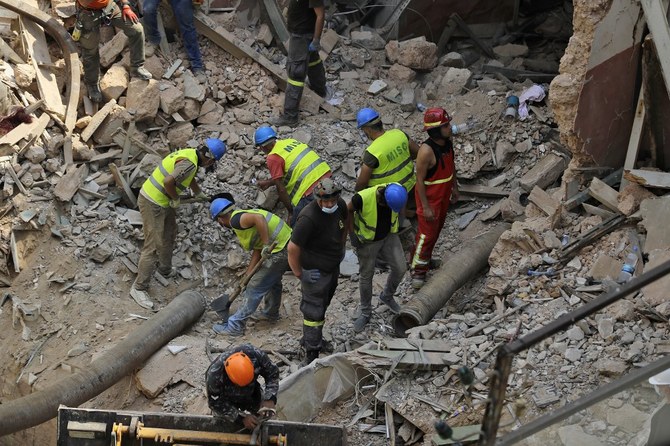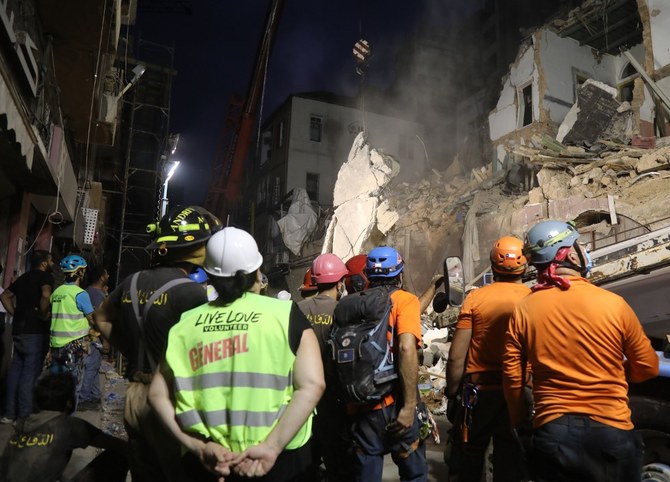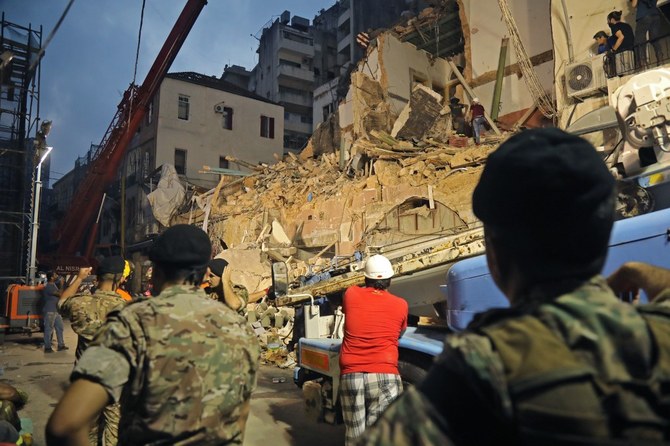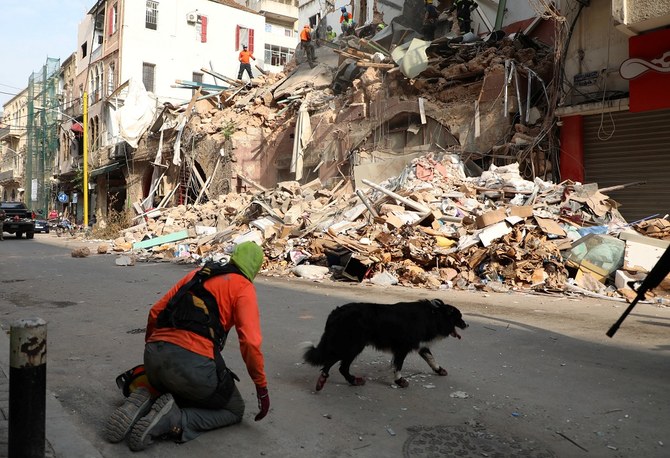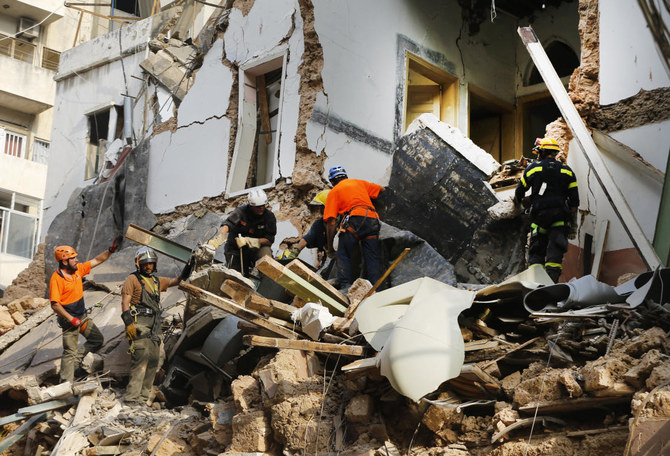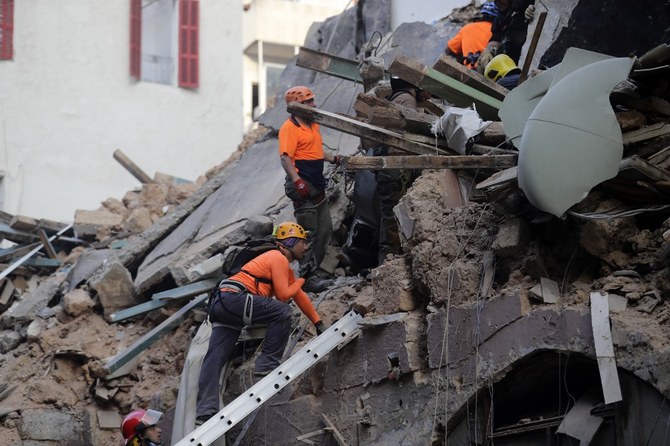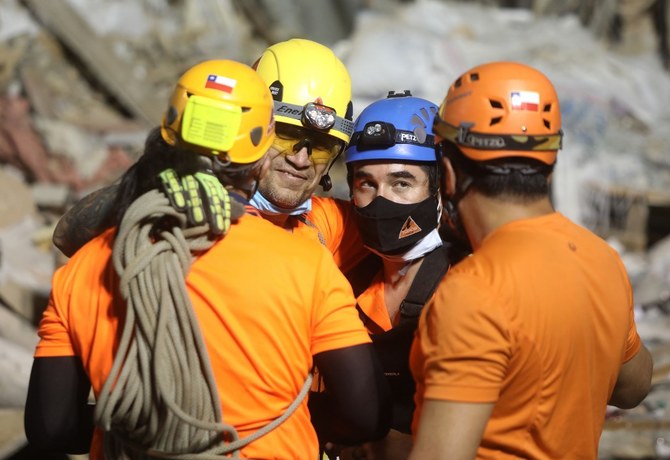BEIRUT: The search for a possible survivor trapped under the debris of a building toppled by the devastating Beirut blast resumed on Saturday in the city’s Gemmayzeh district – two days after a sniffer dog first discovered possible signs of life.
A border collie dog working with volunteer Chilean rescuers had identified what was suspected to be signs of a person beneath the destroyed building on Thursday, sparking an intensive search.
Early on Friday, special equipment appeared to confirm that there were signs of two bodies - one potentially of a survivor after breathing was detected, trapped in the debris.
The life signs were minimak - just 18 breaths per minute, while a faint heartbeat could also be detected, the Chilean team said.
However, Francisco Lermanda, head of the Chilean rescue team, said that it was likely whoever was trapped was in a coma.
The discovery was made 29 days after the huge explosion in Beirut’s port killed almost 200 people, injured 6,000, and devastated large areas of the city.
The building where the search was being conducted had once housed a bar on its ground floor.
“These (signs of breathing and pulse) along with the temperature sensor means there is a possibility of life,” rescue worker Eddy Bitar told reporters at the scene.
Rescue workers in bright jackets clambered over the building that had collapsed in the blast.
Bitar said a civil defense unit had been called in to help with extra equipment to conduct the search.
Local media said any search and rescue effort, if it became clear that someone was still alive, was likely to take hours.
#LIVE: The search for a possible survivor trapped under the debris of a building toppled by the #BeirutBlast resumed on Saturday in the city’s Gemmayzeh district https://t.co/UALTQBFGcn https://t.co/ED3t6ek8Im
— Arab News (@arabnews) September 5, 2020
Residents gathered nearby, holding out hope that someone could be found, while some voiced frustration that not enough had been done earlier to find survivors.
“How many people could have survived if there had been a state and rescue operations ready?” asked 28-year-old Chadem.
Rescue workers, many moving rubble with their bare hands, were preparing to work through Friday night in their efforts to find any survivor. They initially suspended the search operation late on Thursday night, sparking angered reactions from locals.
Lermanda said: “We decided to dig three tunnels to reach him, and today we continued to work in these tunnels. We are only 120 cm away. We cannot yet confirm whether this person is alive or not out of respect for the feelings of the family.”
He added: “We will continue to work and will not stop until we get a result. We will work even if there is a 1 percent chance.” Lebanese troops cordoned off the building on Mar Mikhael Street amid fears the already weakened structure could collapse, while media crews set up facilities in the surrounding buildings for live broadcasts of the rescue operation.
Residents in Beirut’s Gemmayze reacted angrily as rescue workers broke for the night. They resumed the search a short while later at 1 a.m. on Friday (Video: Tony Srour ANfr)
Lebanese troops cordoned off the building on Mar Mikhael Street amid fears the already weakened structure could collapse, while media crews set up facilities in the surrounding buildings for live broadcasts of the rescue operation.
The Chilean volunteers, who arrived in Beirut with their rescue dog Flash four days ago to help search for missing people, have now been hailed as heroes, with one Lebanese activist saying the dog “was smarter than the entire government.”
Paolo Torres, a Chilean-born photojournalist, told Arab News the team belongs to an NGO known as the Topos International Research and Assistance Disaster Relief Foundation, which has extensive experience in mine rescue operations in Chile.
Torres said a member of the Chilean team had told him: “No one brought us here; we came from Chile to help Beirut.”
See more photos of the Beirut blast rescue efforts
Oscar-nominated director Nadine Labaki joined angered residents as they demanded the work continued.
“There could be someone alive,” she said. “That cannot wait until tomorrow morning.”
“You have no brains,” another woman was quoted as saying. “If your sister or mother was there, would you leave them?”
As a crowd gathered to await news of a “miracle,” Beirut residents took to social media to criticize their government, saying it had taken a foreign rescue team to find any signs of life so long after the Aug. 4 explosion.
One described the Chilean dog as a “hero” and wrote that it was “smarter than an entire government.”
However, Beirut Gov. Marwan Abboud, speaking during a visit to the rescue site, said: “Lebanon was not prepared for a crisis like this. We do not have the dogs, thermal machines, or the other equipment that the Chilean rescue team has.”
The Lebanese army said last Saturday that seven people, three Lebanese, three Syrians and one Egyptian, are still missing after the explosion.
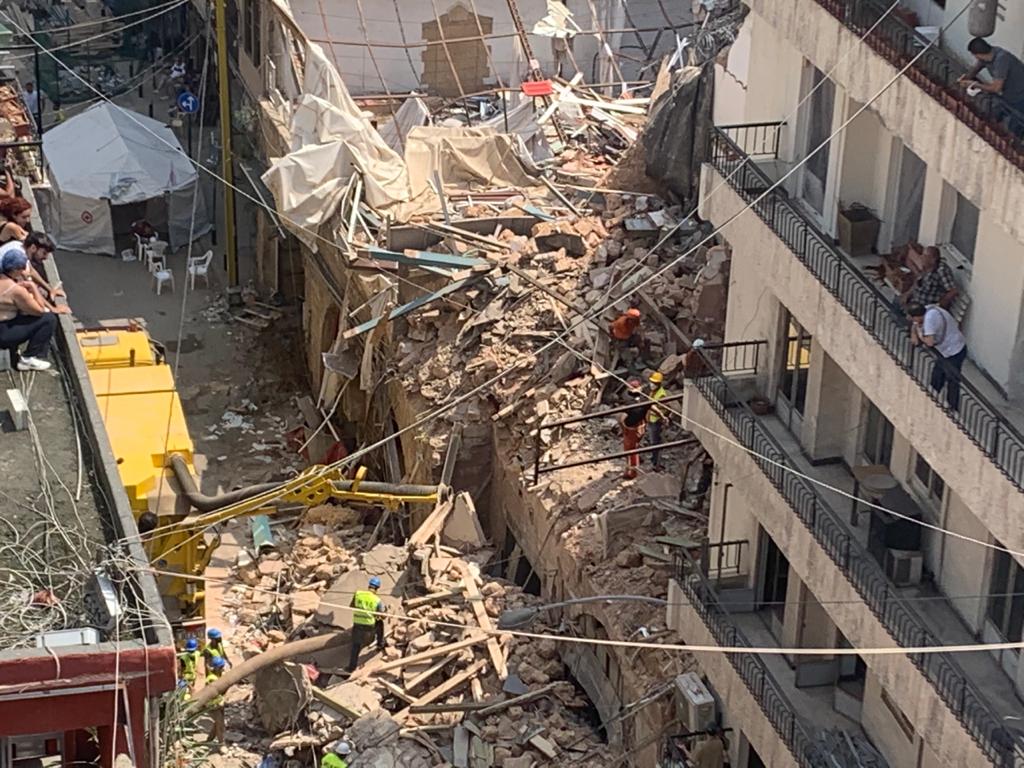
As the search and rescue work continued, a truck was brought in that helps to reduce the dust produced as drilling work continued. (Photo: Tony Srour ANfr)
Across from Mar Mikhail, near Beirut port, a commemoration was held for the 191 victims of the blast in the presence of some of their relatives on Friday evening. Lebanon observed a minute’s silence at 6:08 p.m. on Friday.
Soldiers fired a salute, then laid a white rose for every one of the 191 victims at a memorial. The crowd fell silent at 6:08 p.m., the moment of the explosion that marked the most destructive single blast in Lebanon’s violent history.
The blast displaced 300,000 people and caused direct damage of $15 billion to 50,000 homes, nine major hospitals and 178 schools.
The second phase of the judicial investigation, led by Judge Fadi Sawan, will begin on Monday with four witnesses due to appear. Rola Al-Tabash, a member of the Future Parliamentary bloc, said the possibility that a survivor was still alive in the debris is “a new scandal that parallels the tragedy in Beirut.”
Businessman Bahaa Hariri tweeted that “due to mismanagement by the corrupt authorities, people were left to die under the rubble.”
(With agencies)


